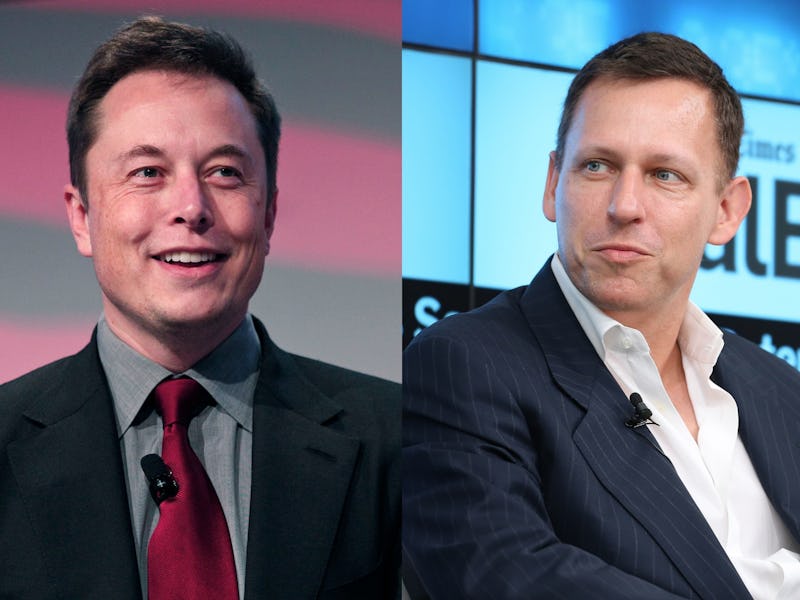The 4 Issues Peter Thiel and Elon Musk Agree On
They're meeting with Trump this week.

Peter Thiel and Elon Musk, the most prominent members of the “Paypal Mafia,” have taken very different paths since leaving the startup. Musk is appearing with Leonardo DiCaprio in climate change documentaries, while Thiel is singing the praises of Donald Trump to anyone who’ll listen. Until now, they’ve been relatively content keeping out of each other’s hair, but that could change on Wednesday when the pair will join a bunch of the tech industry’s biggest and brightest stars at a meeting with Donald Trump.
It’s a big moment, one that could set the stage for the next four years in terms of tech policy. Surprisingly, there are actually quite a few areas where Thiel and Musk see eye-to-eye, and that consensus could give us an insight into which direction the meeting will go in. Here’s four that stand out.
Government Intervention Isn’t Always Bad
You may assume Thiel takes a dim view towards government intervention. Until this year, he was a member of the Libertarian Party, and endorsed Ron Paul for both the 2008 and 2016 elections. But characterizing him as a typical libertarian may be a step too far: he’s given money to small government groups, but seems to advocate for effective government intervention. “I’m not dogmatic about government having to have a small role, but it depends on how well the government works,” he said in a 2014 story. “If you had a government as effective as the New Deal government or say the Kennedy administration in the ’60s, you could have a much larger role for government.”
Elon Musk has built his businesses around government subsidies, as the Los Angeles Times reported in May 2015 that his empire is fed by $4.9 billion in subsidies. Although he describes himself as socially liberal and fiscally conservative, he also supports a carbon tax on industries to combat climate change. Both men see the value in state intervention, but only when necessary.
We Need Better Protections For Low-Wage Workers
Thiel seems an unlikely backer of minimum wage laws, but he’s said in several instances that he supports a higher minimum wage. This is more for practical reasons, he explained when interviewed about signing a 2014 petition, as the alternative would be more people on welfare.
Musk agrees that there need to be some minimum wage commitments, but also advocates for a universal basic income to protect against robot automation. Thiel’s position on basic income is murky: websites have in the past described him as a proponent, and his Y Combinator startup incubator has supported experiments on the idea, but he’s not exactly a major cheerleader for the movement.
Thiel leaves an elevator at Trump Tower, November 16, 2016 in New York City.
Freedom of Speech is Good, but the Media is Sometimes Bad
Thiel received a lot of criticism from parts of the press after everyone learned that he was funding this year’s Hulk Hogan lawsuit against Gawker. The fight against the news outlet led Thiel to clarify that he believed “it’s precisely because I respect journalists that I do not believe they are endangered by fighting back against Gawker.” His critics argue that, as he was motivated by Gawker’s outing of him in 2007, it was a politically-motivated lawsuit aimed at fighting back against a news outlet that had reported about him.
Musk, himself a fervent supporter of American institutions, has also not been afraid to criticize the press in the past. He’s come out against some of the press coverage Tesla’s autopilot feature has received, claiming that publicly questioning the safety of the design is “killing people.” The logic goes that media gives a distorted idea of how many people die in crashes compared to non-computer-driven cars, and convinces the public that regular cars are safer.
We’re All Simulations Living in a Dream World
Okay, so this one is a little out-there, but bear with it. Thiel has donated large sums of money to the Machine Intelligence Research Institute, which has been considering in part the question of whether humanity is living in a giant simulation. Thiel is not upfront about this belief, but Business Insider has previously named him as the likely subject of a New Yorker story on Silicon Valley’s obsession over the idea.
Musk, on the other hand, is pretty upfront about this belief. He told Josh Topolsky at Re/code’s annual conference that “there’s a one in billion chance” that this reality is the real deal, pointing to the explosion in technological innovation over the past 40 years as a sign that simulating worlds isn’t actually that hard.
This last one may not result in any public policy drives, but it gives an insight into what drives Silicon Valley’s minds. That any sort of resources are being directed towards solving this problem suggests the industry enjoys a large degree of freedom to explore “moonshot” projects, some of which do result in innovations like self-driving cars. Musk and Thiel are unlikely to want this era of experimentation to end just yet.